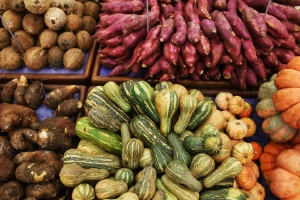
The brilliant rationale behind why the ancient Chinese associated certain seasons of the year with certain organs, then certain organs with flavors of foods (and herbs), had to do with the organic physiological responses to temperature and climate, how they align with each bodily system, and the biochemical reactions incited by each flavor in the body. For example:
Acrid goes up and out. Haven’t we all had the experience of sweating or decongesting after spicy food? Bitter goes down and out. Most have also had the experience of drinking coffee or green tea, then having to go to the bathroom. Sour goes down and in, as does sweet, whereas salty goes down and in, but brings enough water into our cells to then vaporize upwards, which is why its mechanism can RAISE blood pressure.
Unfortunately, in (Traditional) Chinese medical schools, due to modern misinterpretations of the medicine we are lucky if we’re taught half-truths of fact—too often we were told objective untruths—though regarding flavors and seasons we at least got the former.
We were taught that the acrid flavor corresponds with the lungs, which correspond with fall, though this is only one of fall’s flavors, and arguably the less significant one, nor was it ever really explained WHY the lungs correspond with autumn.
Fall is nature’s regression and recession, just as the days grow shorter and animals begin their hibernations, gases and blood in the human body sink deeper, as in towards our adrenal glands, where we can reproduce ample hormones and healthy blood to then rise again in spring. The chemical mechanism induced by acrid foods or herbs DOES NOT encourage this movement. So, while less educated practitioners uniformly advise everyone to eat more onions, garlic, and ginger during fall, recall there should never be any one size fits recommendations in (holistic) medicine or nutrition.
Because the chemistry of acridity moves things upward and out in the body it is surely useful for dislodging the phlegm and mucus often accumulated during allergy, flu, and covid season. It can also be useful for patients who find that during autumn and/or year-round, they have a remarkable difficulty with all kinds of rising—whether out of bed in the morning, off the couch to exercise, intellectually, or in sexual engagement.
For the other half of the population, the more calming, descending mechanism of sour is more logical. Especially since along with bitter, another “flavor of descent,” sour is one the more unrepresented ones in most American diets, maybe partially explaining why modern Americans have so much difficulty with grounding, sleeping, and slowing down.
To understand which flavor should dominate your diet and herbal formulas this season, you can try feeling the (second/middle finger) “guan” pulse position on your left wrist. If the artery feels small or weak your body needs acridity! But if it feels big, inflamed, angry, you need LEMONS 🙂 When life gives you lemons, first feel your pulse. Or get your acupuncturist to do it.
As for nature and safer one size fits all advice: ‘tis the season of root vegetables, so cook plenty of carrots, radishes, beets, yams, and brussels sprouts. In fact, a perfect way to roast the latter is with garlic, onions, and lemon (+salt and olive oil), thereby getting the best of both worlds. Really in my house I should separate them on the pan and take the lemon part for myself and allot all acridity for my wife! But who has the time? I’ll just drink my sour herbs.

